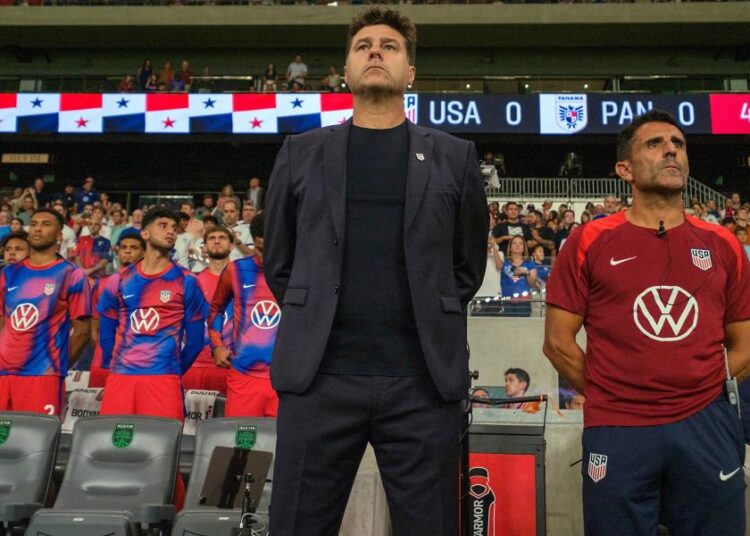Pacing his technical area with puffed cheeks, pursed lips and crossed arms, there was one of the most recognizable faces in club football, the unfamiliar sight of a USA badge on his lapel.
At the final whistle, his brow unfurrowed by the delight of a 2-0 win over Panama in his first game in charge of the US men’s national team, Mauricio Pochettino bounded on to the field with a wide grin, glad-handing everyone in sight, with back-slaps, hugs and handshakes for all, from players to officials to a cameraman.
If the US were in solid shape and on an upward trajectory the former Tottenham, Paris Saint-Germain and Chelsea manager would not have been hired, so Saturday’s result and performance, imperfect as it was, represented an immediate boost after a summer of setbacks. There were smiling faces on the pitch and in the stands of a noisy and nearly full stadium. After a string of poor results and a group stage exit from the Copa América during which the US somehow looked both tempestuous and torpid, this was positive. Different.
Under Pochettino’s predecessor, Gregg Berhalter, the US had become mired in an eternal learning process, always on a journey towards consistent excellence but never reaching that prized destination, even as the core group, many of them teenagers when he took charge, entered their mid-20s.
Now it is time for some progress, with the co-hosts only 20 months away from the 2026 World Cup and the number of international windows remaining before the tournament down to single figures. Berhalter sourced the ingredients; Pochettino has to blend, cook and serve them in two summers’ time. Preferably well-done.
Related: Kylian Mbappé: the symbol of malaise amid France’s generational shift
“I think it was a very professional performance and I think we are happy because I think all the [targets] that we said before the game, I think that we got and I think it’s an important victory,” Pochettino told reporters.
Panama, after all, in effect torpedoed Berhalter’s long tenure with a wince-inducing 2-1 Copa win in June. The US have lost five times in 11 games in 2024, the most defeats in a calendar year since 2019, Berhalter’s first year. Entering this friendly at Q2 Stadium in Austin the US had won only once in their past seven fixtures, back in June against Bolivia, South America’s worst team.
It’s not a record that chimes with the view that the US are Concacaf’s dominant force and have the potential to go deep in 2026 – a belief, surely, that helped convince the former Argentina defender to depart the club scene for his first foray into international management.
Following his departure from Chelsea, Pochettino would surely have been offered a job before long at another top-tier European club. Instead he was in Texas in front of a crowd of 20,239, steering players of varying ability for a federation that tapped into a gift from a Floridian hedge fund billionaire and Republican megadonor in order to cover his reported $6m annual salary.
Pochettino observed in 2022 that in Paris, where he coached Kylian Mbappé, Lionel Messi and Neymar, a surfeit of superstars created problems. “Too much greatness” is not going to be an issue in this role. Only Christian Pulisic, with six goals in nine appearances for Milan this season, is in that category.
A host of injuries to first-team regulars meant that Pochettino’s lineup was by necessity a chance to cast his eye over players who were marginal contributors under Berhalter. There was no Gio Reyna, Tim Weah or Folarin Balogun to spark the attack. No Tyler Adams or Weston McKennie in midfield or Sergiño Dest and Chris Richards in defense. Intriguingly, Tim Ream captained the side a week after his 37th birthday. Does Pochettino believe Ream could contribute at the World Cup despite his advanced age? Did he want some veteran leadership to provide stability in his first game? Did he have limited alternatives? Yes.
Up front, Pochettino started Norwich City’s Josh Sargent, who smashed an easy chance over the bar from eight yards in the first half. In doing so, Sargent perpetuated the sobering sense that – like Chris Wondolowski before him – he is an effective goal producer in a second-tier league who is unable to replicate his form reliably for the national team. The 24-year-old last scored for the US in 2019.
Still, he would have seemed a better bet to find the net than Yunus Musah, employed as a defensive midfielder by Berhalter. After a busy but ineffective first half reminiscent of the pre-Poch era for its inability to subdue or carve apart decent and energetic opposition, the first goal under new management was scored by Musah: his maiden international strike in his 42nd cap.
Here was a break from the past: Pochettino deployed Musah on the right wing and gave him license to attack. It was, the coach said, an attempt to reinvigorate a player with limited minutes for Milan this season. “[We] tried to build his confidence maybe from starting in a different position than he was starting in the past. I think that was a good decision,” Pochettino told reporters.
The buildup to the 49th-minute goal was also a refreshing change, with evidence of teamwork and calculation that had often been lacking under Berhalter, when there seemed to be few offensive schemes beyond asking a pacy winger to charge at the defense and hoping to profit from whatever chaos might ensue. It was jarring, in a good way, to see Musah burst towards the six-yard box (a run that Sargent might have been expected to make) to finish off a cross from Pulisic, his club teammate, as if he’d been doing it all his life.
Panama then pressurized the US and had a couple of good chances to equalize before a relatively straightforward breakaway goal in injury-time sealed victory. Here, too, the identity of the goalscorer implied a deviation from earlier struggles, a period of new possibilities. Ricardo Pepi, a substitute, had not scored for his country for 11 months, but his shot found a way through the goalkeeper’s legs. The shut-out and a couple of important saves by Matt Turner, whose career in England appears headed down a blind alley, also felt restorative.
The atmosphere may change when Pochettino’s honeymoon wears off: when players are marginalized and grow disillusioned, and later in the season when they are tired and carrying knocks and his intense training sessions and high pressing style seems like an exhausting imposition for footballers whose primary focus is naturally on the club game that absorbs the large majority of their time and provides nearly all of their income.
The mood might even shift as soon as Tuesday, when the US visit Guadalajara for a friendly against Mexico that should provide a stiff test, not least since the Americans haven’t played a match outside their own country since last November.
But, despite the blemishes and elements of fortune, the win was what mattered most for a team that lost to Canada and drew with New Zealand in friendlies last month under an interim coach. It builds more trust in a manager whose past achievements already ensure he commands respect from players and fans, and it points the US in the direction of something different, something better.
Read the full article here

























